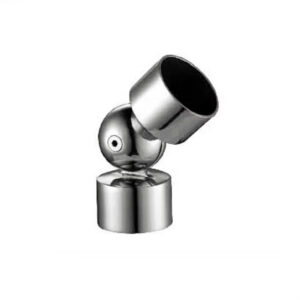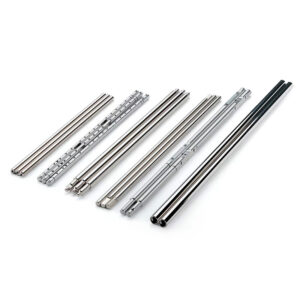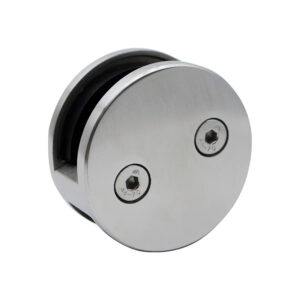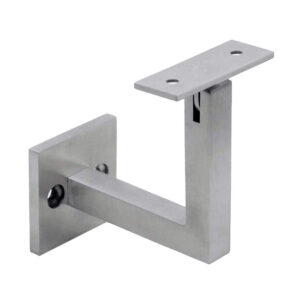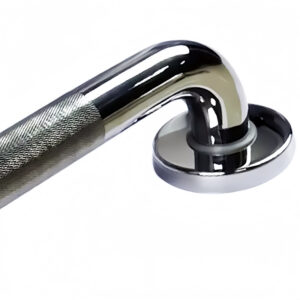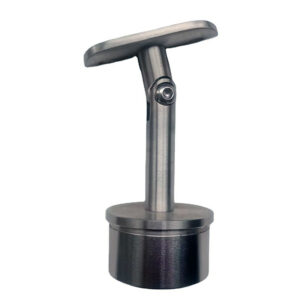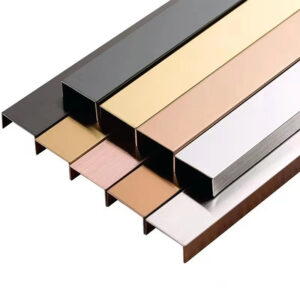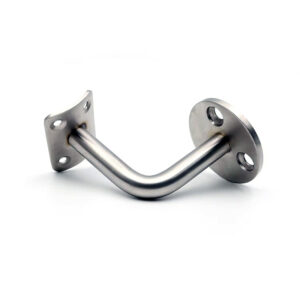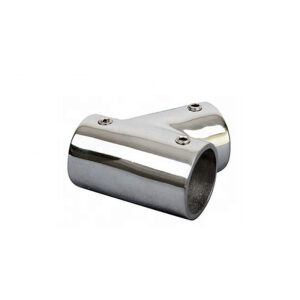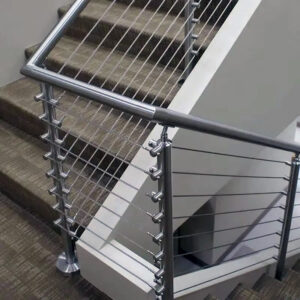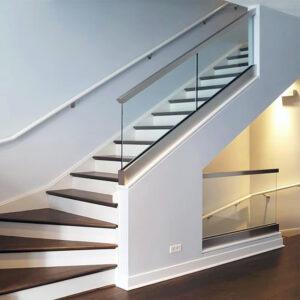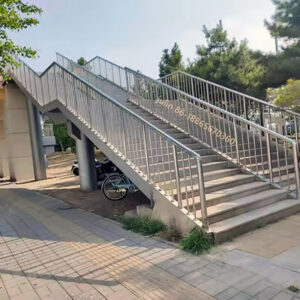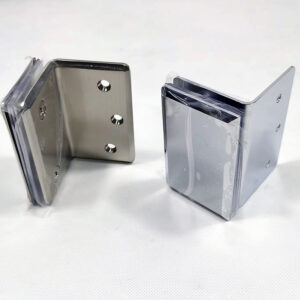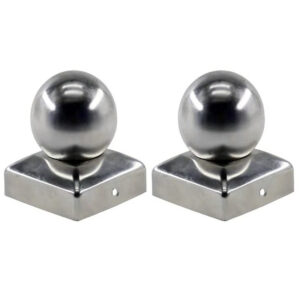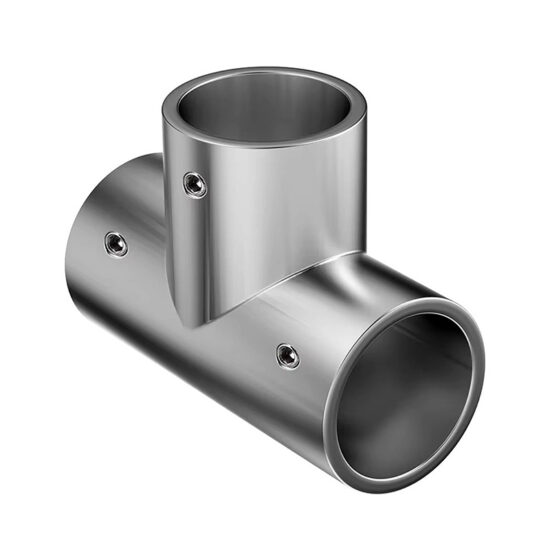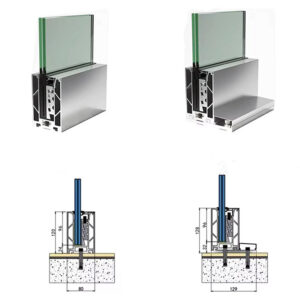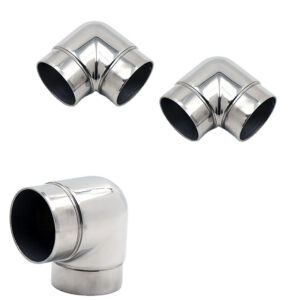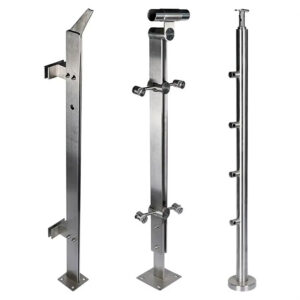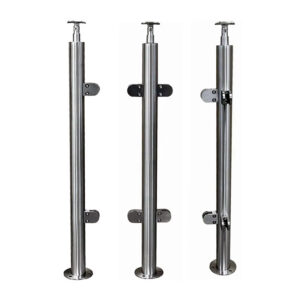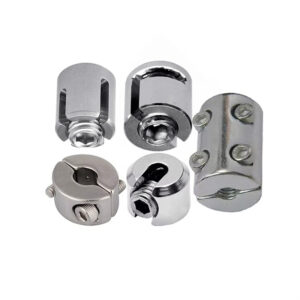Standard railing hardware works for most projects, but what happens when architects design something unique? After 23 years of manufacturing experience, we’ve learned that custom fabrication services aren’t just about making one-off pieces—they’re about solving problems that standard catalogs can’t address. Whether it’s matching historical details, meeting unusual load requirements, or integrating with specialized structural systems, custom fabrication bridges the gap between design vision and practical installation.
Comprehensive Custom Fabrication Capabilities
Handrail System Customization
Standard wall-mount and post-mount systems handle most applications, but custom projects often require modified mounting configurations, non-standard spans, or integration with existing structures. Our custom fabrication services extend beyond simple dimensional changes:
Modified Mounting Systems: Custom brackets for unusual wall conditions, angled installations, or structural integration requirements. We’ve fabricated mounting solutions for curved walls, sloped surfaces, and multi-level transitions where standard hardware won’t work.
Specialized Handrail Profiles: While round and rectangular profiles cover most needs, some projects require custom cross-sections for ergonomic requirements, architectural matching, or code compliance in specialized facilities like healthcare environments.
Integration Hardware: Custom connectors, transitions, and interface components that allow our standard systems to work with other manufacturers’ products or existing installations.
“Custom fabrication reduces field modification time by up to 60% compared to adapting standard components on-site.” —National Association of Construction Contractors
Bespoke Railing Manufacturing for Unique Applications
Glass Railing Adaptations: Standard glass clamps and spigots work for typical installations, but custom projects often need modified clamping systems for unusual glass thicknesses, curved panels, or specialty glazing materials. Our ODM custom manufacturing capabilities include engineered clamping solutions that maintain structural integrity while accommodating non-standard specifications.
Cable Railing Customization: Custom cable railing systems for applications requiring non-standard spacing, unusual post configurations, or integration with architectural features. This includes custom tensioning hardware for long spans and specialized fittings for curved or angled installations.
Architectural Integration: Custom fabrication services that create seamless transitions between railing systems and building elements—stairs, floor systems, roof structures, or decorative architectural features.
Material Specifications and Selection
| Material Grade | Typical Applications | Custom Fabrication Advantages | Lead Time Impact |
|---|---|---|---|
| 304 Stainless | Interior, standard environments | Lower cost for prototype development | Shorter lead times |
| 316 Stainless | Exterior, coastal applications | Superior corrosion resistance | Standard processing |
| Custom fabrication services 316L | Marine, chemical exposure | Reduced carbon content for welding | Additional 1-2 weeks |
| Duplex Stainless | High-stress applications | Enhanced strength properties | Extended lead times |
Surface Treatment Options: Beyond standard brushed and mirror finishes, custom fabrication allows for specialized surface treatments including custom grain patterns, texture matching for renovation projects, or protective coatings for specific environmental conditions.
Technical Specifications for Custom Work
Load Capacity and Engineering Support
Custom fabrication services include complete engineering analysis for non-standard applications. Our technical team provides:
Structural Calculations: Load analysis for custom configurations, including wind loads, seismic considerations, and dynamic loading from pedestrian traffic.
Code Compliance Documentation: Engineering stamps and documentation for custom solutions, ensuring local code compliance without delays during inspection processes.
Integration Engineering: Structural analysis for mounting custom hardware to existing structures, including reinforcement recommendations and connection details.
| Custom Configuration | Load Capacity (lbs/ft) | Engineering Required | Typical Applications |
|---|---|---|---|
| Extended span handrails | 200-300 | Full analysis | Atriums, long corridors |
| Curved railing systems | 150-250 | Geometric analysis | Circular stairs, curved balconies |
| High-wind applications | 300-450 | Wind load analysis | Coastal, high-rise installations |
| Historic restoration | Varies by design | Specialized review | Heritage buildings, renovations |
Dimensional Capabilities and Tolerances
Fabrication Range: Custom pieces from small brackets to complete railing assemblies up to 20 feet in length. Larger installations are engineered as modular systems for transportation and installation efficiency.
Precision Standards: Custom fabricated components maintain ±0.030″ tolerance for critical dimensions, ensuring proper fit with standard components and architectural requirements.
Quality Control: Each custom piece undergoes dimensional verification, surface quality inspection, and fit-testing when possible before shipment.
Real Project Applications
Commercial and Institutional Projects
Healthcare Facilities: Custom handrails for patient care areas often require specific profiles for infection control, unusual mounting heights for accessibility compliance, or integration with medical equipment. Recent projects included custom wall protection integrated with handrail systems and specialized mounting for MRI-safe environments.
Installation time for these custom solutions typically runs 20-30% longer than standard systems, but eliminates the field modification time that would otherwise be required.
Educational Buildings: Custom railing solutions for schools and universities often involve matching historical architecture or meeting specialized safety requirements. Projects have included custom picket spacing for child safety, custom heights for multi-use areas, and architectural integration with existing masonry and structural elements.
“Bespoke railing manufacturing delivered exactly what our restoration project required—modern safety compliance with historical accuracy.” —American Institute of Architects
Residential and Multi-Family Applications
High-End Residential: Custom fabrication services for luxury homes include one-off designs that integrate with specific architectural themes. Projects range from custom picket designs that match interior decorative elements to complete railing systems engineered for unusual floor plans or structural requirements.
Multi-Family Housing: While standardization typically drives efficiency in housing projects, custom solutions solve specific problems: unusual stair configurations, integration with pre-cast concrete systems, or modifications for accessibility compliance in retrofit projects.
Renovation Projects: Existing buildings often require custom solutions to integrate modern railing systems with older structural elements. Our custom fabrication services have solved problems ranging from non-standard mounting surfaces to matching historical profiles with modern materials and engineering.
Industrial and Infrastructure Custom Solutions
Manufacturing Facilities: Industrial custom fabrication often focuses on durability and maintenance access rather than appearance. Custom solutions include removable sections for equipment access, specialized mounting for vibrating structures, and chemical-resistant treatments for specific industrial environments.
Marine and Coastal Applications: Custom stainless steel fabrication for marine environments typically involves 316 or custom fabrication services 316L materials with specialized welding procedures and enhanced corrosion protection. Projects include custom mounting systems for floating docks, railings engineered for wave action, and specialized drainage integration.
| Project Type | Lead Time (weeks) | Engineering Phase (weeks) | Common Customizations |
|---|---|---|---|
| Commercial interiors | 4-6 | 1-2 | Mounting, finishes, integration |
| Exterior installations | 6-8 | 2-3 | Materials, weathering, structural |
| Industrial applications | 8-12 | 3-4 | Materials, access, maintenance |
| Marine/coastal | 10-14 | 4-5 | Corrosion resistance, structural |
▶ Discuss Your Custom Requirements ◀
Custom Fabrication Process and Support
Design Development and Engineering
Initial Consultation: Custom projects begin with detailed discussion of requirements, constraints, and objectives. Our 23 years of experience helps identify potential issues early and suggest practical alternatives when original concepts present installation or maintenance challenges.
Design Review: Technical review of architectural drawings, identification of interface requirements, and preliminary material selection. This phase typically takes 1-2 weeks and results in a detailed proposal with specifications, pricing, and timeline.
Engineering Phase: Complete structural analysis, detail drawings, and specification development. For complex custom work, this includes 3D modeling, finite element analysis when required, and coordination with project engineers.
Manufacturing and Quality Control
Prototype Development: For complex custom pieces, we often recommend prototype fabrication to verify fit, finish, and installation procedures. Prototypes help identify potential issues before full production and ensure final quality meets expectations.
Production Management: Custom work receives dedicated production scheduling to meet project timelines. Regular progress updates keep project teams informed of manufacturing status and any potential schedule impacts.
Quality Verification: Each custom piece undergoes inspection for dimensional accuracy, surface quality, and compliance with specifications. Final inspection includes photography and documentation for project records.
Installation Support and Coordination
Installation Guidance: Detailed installation instructions, specialized tool requirements, and technical support during installation. Our team can provide phone support or on-site consultation for complex installations.
Field Problem Resolution: When field conditions don’t match drawings, our engineering team can quickly develop solutions or modifications to keep projects on schedule.
Project Coordination: Communication with general contractors, installation teams, and project managers throughout the process to ensure smooth project execution.
Tailored Fabrication Solutions FAQ
Q: How do lead times for custom work compare to standard products?
A: Custom fabrication typically adds 4-8 weeks to standard delivery times, depending on complexity. Simple modifications like custom lengths or mounting configurations add minimal time, while complete custom designs requiring engineering analysis need longer development phases. Our project management team provides realistic timelines during the quotation process.
Q: What’s the minimum order quantity for custom pieces?
A: Most custom fabrication projects work with quantities as small as single pieces, though unit costs decrease with larger quantities. For architectural projects, we often see orders of 10-50 custom pieces, while industrial applications might require hundreds of identical custom components.
Q: How do you ensure custom pieces integrate properly with standard hardware?
A: Our ODM custom manufacturing process maintains compatibility with standard components wherever possible. Custom pieces use standard connection methods, mounting dimensions, and finish processes unless specific requirements dictate otherwise. This approach reduces inventory complexity and ensures long-term parts availability.
Q: What engineering documentation do you provide for custom solutions?
A: Documentation varies by project requirements but typically includes detail drawings, material certifications, structural calculations for load-bearing components, and installation specifications. For projects requiring professional engineer approval, we can provide stamped drawings and calculations.
Q: Can you match existing finishes and materials for renovation projects?
A: Matching existing materials is often possible, though exact matches depend on the original specifications and current material availability. We can provide samples for approval and work with project teams to achieve acceptable matches for renovation and restoration work.
Q: How do you handle design changes during the fabrication process?
A: Early design changes are typically manageable with minimal schedule impact. Once fabrication begins, changes become more expensive and time-consuming. We encourage thorough design review and approval before production begins to avoid delays and additional costs.
Custom vs. Standard Solutions Comparison
Understanding when custom fabrication makes sense requires honest evaluation of alternatives and their long-term implications:
| Factor | Standard Products | Custom Fabrication | Modified Standard |
|---|---|---|---|
| Initial Cost | Lowest | Highest | Moderate |
| Lead Time | 2-4 weeks | 6-14 weeks | 4-8 weeks |
| Design Flexibility | Limited | Complete | Moderate |
| Future Availability | Excellent | Project-specific | Good |
| Installation Complexity | Lowest | Variable | Moderate |
| Engineering Support | Standard | Comprehensive | Limited |
Standard Products work best for typical applications where catalog specifications meet project requirements. They offer the lowest cost, fastest delivery, and simplest installation.
Custom Fabrication Services make sense when standard products cannot meet architectural, structural, or functional requirements. The higher initial investment often pays off through reduced field labor, better performance, or architectural integration.
Modified Standard Products represent a middle ground—standard components with dimensional or finish modifications that don’t require complete custom engineering.
Our 23 years of manufacturing experience helps determine which approach provides the best long-term value for specific project requirements. Esang Metal combines standard product efficiency with custom fabrication capabilities to solve complex railing and hardware challenges.
“The right custom solution eliminates field problems that would otherwise cost far more than the initial fabrication investment.” —Construction Specifications Institute
▶ Connect with Our Technical Team ◀
Custom fabrication services bridge the gap between standard catalog products and unique project requirements. Success depends on early collaboration, realistic timeline planning, and clear communication throughout the design and manufacturing process. Our experience solving diverse custom challenges helps ensure your project gets the right solution—whether that’s a simple modification or a completely bespoke design.
